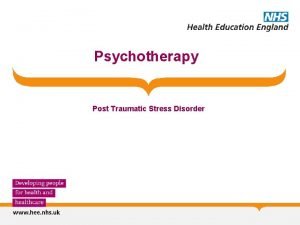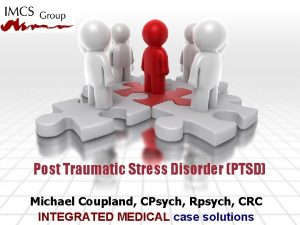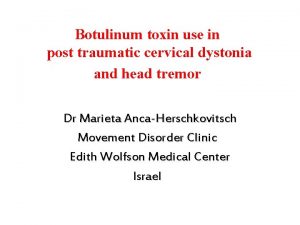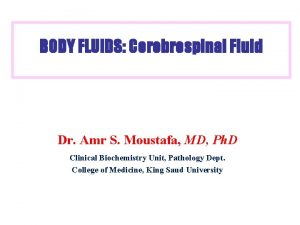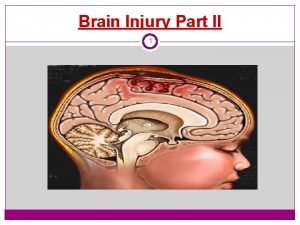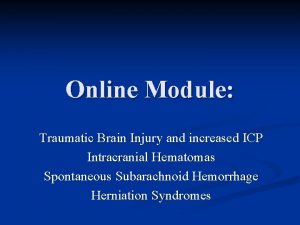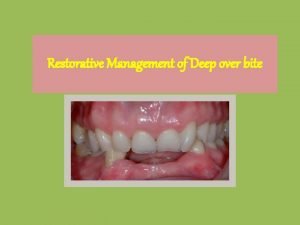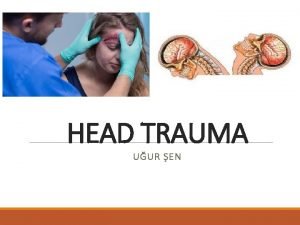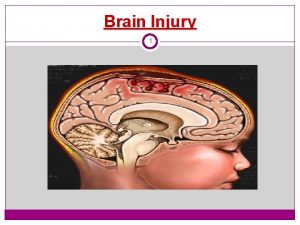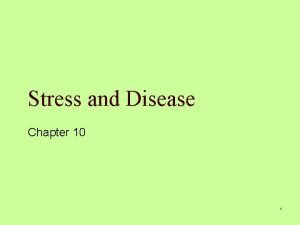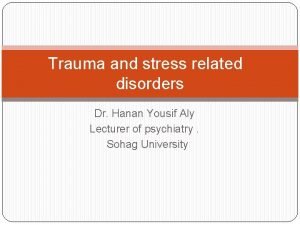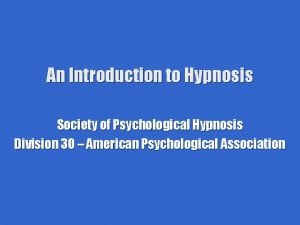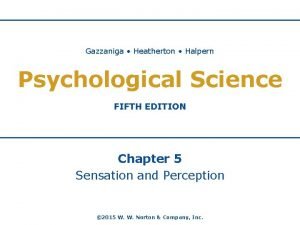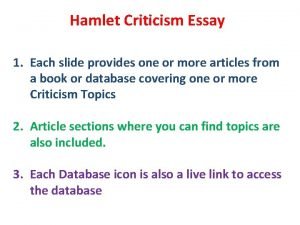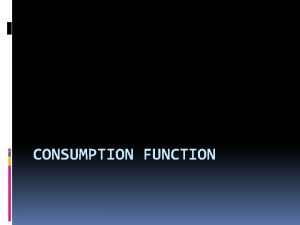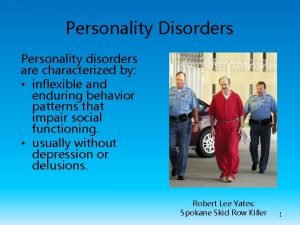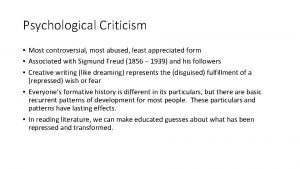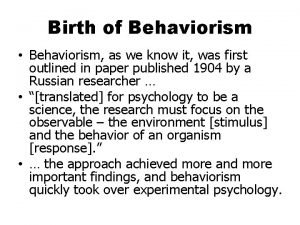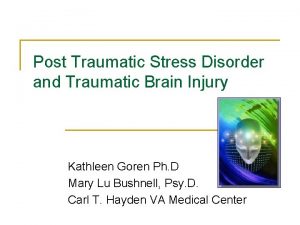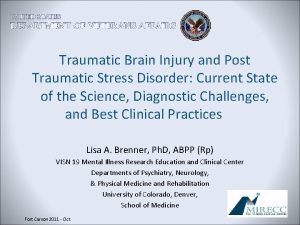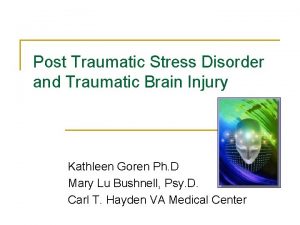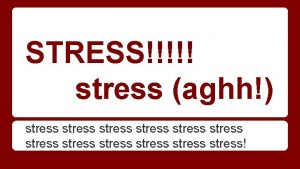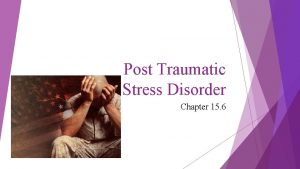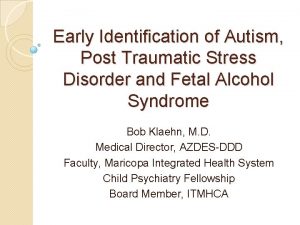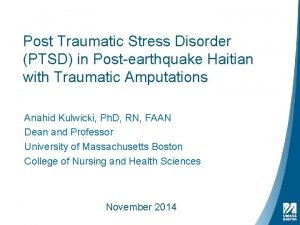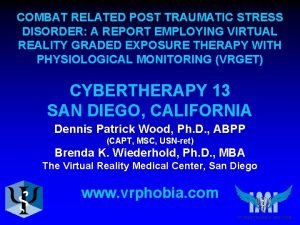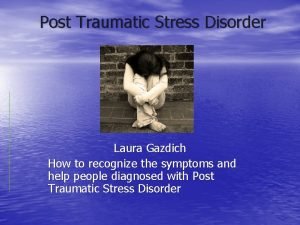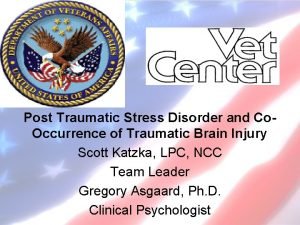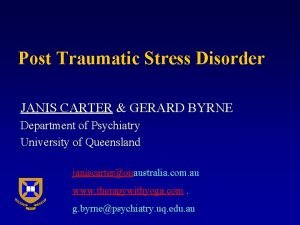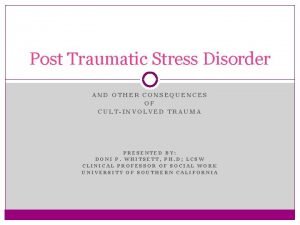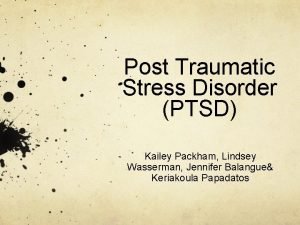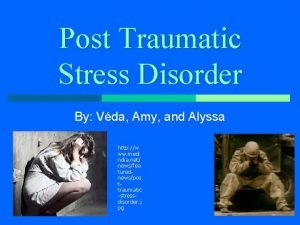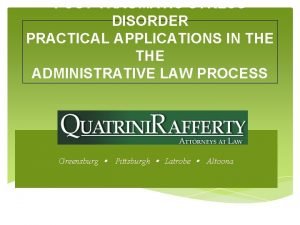Psychological Treatment of post traumatic stress disorderPTSD A



























- Slides: 27

Psychological Treatment of post -traumatic stress disorder(PTSD) A Summary of a Systematic Review Robert Williams, LCSW, BCD University of Utah

Study Details Bisson J, Andrew M. Psychological treatment of posttraumatic stress disorder (PTSD). Cochrane Database of Systematic Reviews 2007, Issue 3. Art. No. : CD 003388. Retrieved Jan 25, 2012 from www. onlinelibrary. wiley. com

Objectives To perform a systematic review of randomized controlled trials of all psychological treatments following the guidelines of The Cochrane Collaboration.

Plain Language Summary There is evidence that individual trauma focused CBT, EMDR, Stress Management and group TFCBT are effective treatments of PTSD. Other non-trauma focused psychological treatments did not reduce PTSD symptoms as significantly Some evidence that individual TFCBT and EMDR are superior to stress management at 2 to 5 months post treatment and TFCBT and EMDR are superior to otherapies Trauma focused treatments are more effective than nontrauma focused treatments.

Search Strategy Searched the Cochrane Optimal RCT search strategy using the following words: PTSD, Trauma, Cognitive, Behavioural, exposure, EMDR, psychological, psychotherapy, psychodynamic, stress inoculation, relaxation, anxiety management Databases: Medline, clinpsych, psychlit, Embase, Pilots (a specialized PTSD database maintained by the. National PTSDCentrein the USA), Trials Register of the Cochrane Depression, Anxietyand Neurosis Group, lilacs, psynebs, sociofile.

Search Strategy (cont) Hand Search of Journal of Traumatic Stress, ISTSS Treatment Guidelines (Foa 200) Reference lists of studies identified in the search Internet Search of known websites and discussion for a Personal communication with NICE guidelines development group who shared their searches and communication with 38 researchers Abstracts/Dissertations from the meetings of the European International Societies of Traumatic Stress Studies

Inclusion Criteria All RCTs focusing on considering one or more defined psychological treatments to reduce PTSD symptoms. All adult individuals suffering from traumatic stress symptoms at least 70% diagnosed with PTSD according to DMS or ICD criteria There was no criteria for severity of symptoms Multiple Interventions were considered

Inclusion Criteria Intervention Types Included Individual Trauma Focused CBT Includes Exposure Therapies Stress management/relaxation TFCBT Group Therapy Non Trauma focused CBT group therapy Other psychological Treatment EMDR Wait list/usual care

Inclusion Criteria Outcome Measure Primary measure was severity of clinician rated traumatic stress symptoms using a standardized measure such as the Clinician Administer PTSD Symptom Scale (Blake 1995) Other Measures included: Pt administered scales Severity of anxiety scales Droupout rates PTSD diagnosis after treatment Any adverse effects (increased symptomology)

Exclusion Criteria Assessed methodological quality using standard approach described in Cochrane Handbook. Utilized a 23 criteria scale with scores between 0 -2 total maximum score 46. Double reviewed disagreements discussed between reviewers regarding study quality Cutoff score was not identified in the review

Reasons for Exclusion Did not satisfy inclusion criteria Less than 3 months follow up following trauma Treatment for anger only Relaxation treatments with no comparison Comparison of two CBT techniques only

PRISMA Search Flow Diagram There was no search flow diagram included in this Systematic review. There was no information on the number of studies identified and screened. Inclusion & exclusion numbers were acquired by counting studies noted in tables. 11 studies were excluded. 41 studies were included in this systematic review.

Data Synthesis Data was summarized a pooled effects calculated using Rev. Man 4. 1 software Continuous outcomes were analyzed as standard mean differences. Data were pooled using fixed effects meta-analysis except were heterogeneity was present Heterogeneity was assessed with both the I Squared test and the chi-squared test of heterogeneity.

Statistical Analysis To achieve meaningful results as non-trauma focused group CBT, hypnotherapy, psychodynamic therapy and supportive counseling all had only one trial they were grouped into a group called otherapies. The number of statistical analyses run was immense Therapy groups were broken into subgroups by type of outcome measurement Comparisons were then made of internal efficacy and comparison to other treatment modalities

Biases Potential Publication bias was noted by the reviewers All of the studies in this review were published or accepted for publication Potential effects of this bias were explored using funnel plots. Smaller studies may tend to report larger between TFCBE and waitlist/usual care Both suggest an absence of studies demonstrating no difference or a difference in favor of the waitlist/usual care Due to greater likelihood of publication of positive studies it is possible true difference between groups is smaller than suggested by this review

Risk of Bias Well completed Minor errors/ Not explained Randomization 7 26 Allocation Concealment 1 27 Blinding 20 Loss to follow up 11 Inadequate Protections 6 13 19 3

Results Trauma Focused Cognitive Behavioral Therapy There was good evidence TFCBT was better than wait list/usual care Some evidence TFCBT was more effective than nontrauma focused therapies TFCBT was significantly better than otherapies and than stress management at follow up

Results Stress Management Evidence that stress management is better than wait list in reducing PTSD symptoms and symptoms of anxiety and depression Based on two studies with small sample size

Results Other Therapies There was no difference between otherapies and waitlist/usual care on main outcome measure Care recipients did fare better on self report traumatic stress and anxiety measure Did not do as well with TFCBT and Stress Managment

Results Group TFCBT Evidence group TFCBT was better than waitlist care as usual This was based on one study with small sample size No difference between Group TFCBT and nontrauma focuses CBT

Results EMDR Evidence that EMDR was better than waitlist/care as usual in reducing traumatic stress symptoms and additionally symptoms associated with depression and anxiety Included studies had small sample size and two lacked randomization concealment As with TFCBT results may be stronger than suggested because of ongoing contact with wait list group Clinician rated traumatic stress represents a strong positive effect size however self reported PTSD symptom severity did not reach statistical significance

Author’s Conclusion Psychological treatment can reduce traumatic stress symptoms TFCBT and EMDR have best evidence for efficacy Some limited evidence stress management is effective More limited evidence that non trauma focused psychological treatments are effective Drop-out from treatment is an issue with currently available treatment

Author’s Conclusion Further well designed studies of psychological treatment are required that consider boundary issues Large EMDR trials are required There is a need for more treatment comparison trials Further trial should enforce stronger quality control of intervention and control groups Role of psychological treatment in combination and as an alternative to medication is unclear

Questions/Concerns Basis for Comparison Differing kinds of therapies were grouped. How effective were the groupings. Is mean difference the best statistical method?

Questions?

References Bisson J, Andrew M. Psychological treatment of posttraumatic stress disorder (PTSD). Cochrane Database of Systematic Reviews 2007, Issue 3. Art. No. : CD 003388. Retrieved Jan 25, 2012 from www. onlinelibrary. wiley. com

 Cptsd vs ptsd
Cptsd vs ptsd Diagnosis of post traumatic stress disorder
Diagnosis of post traumatic stress disorder Post traumatic stress disorder
Post traumatic stress disorder Post-traumatic cervical dystonia
Post-traumatic cervical dystonia Csf traumatic tap
Csf traumatic tap Subdural hematoma concept map
Subdural hematoma concept map Hyponuria
Hyponuria Tonsillar herniation
Tonsillar herniation Traumatic overbite
Traumatic overbite Tbi long term servival after traumatic
Tbi long term servival after traumatic Basal skull fracture
Basal skull fracture Halo effect csf
Halo effect csf Damselfly
Damselfly Biliary tree
Biliary tree What is the definition of axial stress
What is the definition of axial stress True stress vs engineering stress
True stress vs engineering stress Chapter 10 stress responses and stress management
Chapter 10 stress responses and stress management Post trumatic stress disorder
Post trumatic stress disorder Society of psychological hypnosis
Society of psychological hypnosis Leonard pearlin
Leonard pearlin Todd f. heatherton
Todd f. heatherton Psychological criticism essay
Psychological criticism essay Keynes psychological law of consumption
Keynes psychological law of consumption Psychological facts about dreams
Psychological facts about dreams Inflexible personality
Inflexible personality Psychological criticism
Psychological criticism Behaviorism and neobehaviorism
Behaviorism and neobehaviorism Trafford psychological therapies
Trafford psychological therapies
